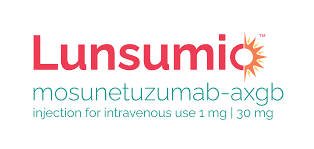Adcetris (brentuximab vedotin) vs Lunsumio (mosunetuzumab-axgb)
Adcetris (brentuximab vedotin) vs Lunsumio (mosunetuzumab-axgb)
Adcetris (brentuximab vedotin) is an antibody-drug conjugate specifically targeting CD30-positive cells, commonly used for treating Hodgkin lymphoma and systemic anaplastic large cell lymphoma. Lunsumio (mosunetuzumab-axgb), on the other hand, is a bispecific T-cell engager antibody targeting both CD20 on B-cells and CD3 on T-cells, indicated for the treatment of relapsed or refractory follicular lymphoma. When deciding between these two medications, it is crucial to consider the specific type of lymphoma being treated, the patient's previous treatments and responses, and the unique safety profiles of each medication, as they are designed to target different antigens and are used in different lymphoma subtypes.
Difference between Adcetris and Lunsumio
| Metric | Adcetris (brentuximab vedotin) | Lunsumio (mosunetuzumab-axgb) |
|---|---|---|
| Generic name | Brentuximab vedotin | Mosunetuzumab-axgb |
| Indications | Hodgkin lymphoma, systemic anaplastic large cell lymphoma, primary cutaneous anaplastic large cell lymphoma, and certain types of mycosis fungoides | Follicular lymphoma |
| Mechanism of action | CD30-directed antibody-drug conjugate | Bi-specific T-cell engager antibody |
| Brand names | Adcetris | Lunsumio |
| Administrative route | Intravenous infusion | Intravenous infusion |
| Side effects | Neutropenia, peripheral neuropathy, anemia, infusion-related reactions, thrombocytopenia, etc. | Cytokine release syndrome, hypotension, fever, fatigue, headache, etc. |
| Contraindications | Hypersensitivity to brentuximab vedotin or any excipients | Hypersensitivity to mosunetuzumab-axgb or any excipients |
| Drug class | Antineoplastic agent, monoclonal antibody | Antineoplastic agent, monoclonal antibody |
| Manufacturer | Seagen Inc. | Genentech, Inc. |
Efficacy
Efficacy of Adcetris (Brentuximab Vedotin) in Lymphoma
Adcetris (brentuximab vedotin) is an antibody-drug conjugate specifically indicated for the treatment of several types of lymphoma, including Hodgkin lymphoma (HL) and systemic anaplastic large cell lymphoma (sALCL). In clinical trials, Adcetris has shown significant efficacy in patients with relapsed or refractory HL following autologous stem cell transplant (ASCT). The pivotal phase III trial demonstrated a marked improvement in progression-free survival (PFS) compared to the control arm, establishing Adcetris as a standard of care in this setting. Additionally, for sALCL, Adcetris has been shown to induce high response rates with a considerable number of patients achieving complete remission, highlighting its efficacy in this subtype of lymphoma.
Efficacy of Adcetris in Other Lymphoma Subtypes
Adcetris has also been evaluated in other CD30-expressing lymphomas, including cutaneous T-cell lymphoma (CTCL) and other peripheral T-cell lymphoma (PTCL) subtypes. In CTCL, Adcetris has been associated with significant response rates, particularly in the subset of patients with systemic involvement. For PTCL, clinical studies have shown that Adcetris, as a single agent or in combination with chemotherapy, can lead to meaningful clinical responses, suggesting its potential role in the broader management of lymphoma beyond HL and sALCL.
Efficacy of Lunsumio (Mosunetuzumab-axgb) in Lymphoma
Lunsumio (mosunetuzumab-axgb) is a bispecific T-cell engager antibody indicated for the treatment of relapsed or refractory follicular lymphoma (FL) after two or more lines of systemic therapy. In clinical trials, Lunsumio has shown promising efficacy in FL, with a significant proportion of patients achieving complete remission. The objective response rates reported in these studies suggest that Lunsumio can induce durable responses in a patient population with limited treatment options. Its mechanism of action, which redirects T cells to engage and eliminate B cells, represents a novel therapeutic approach in the management of B-cell lymphomas.
Comparison and Considerations
While both Adcetris and Lunsumio have shown efficacy in the treatment of different types of lymphoma, their mechanisms of action, indications, and clinical use differ. Adcetris targets CD30-expressing cells and is used in HL, sALCL, and other CD30-positive lymphomas, whereas Lunsumio targets CD20-expressing cells and is used in FL. The choice of therapy would depend on the specific lymphoma subtype, previous treatments, and the individual patient's health status. Both drugs have expanded the therapeutic landscape for lymphoma and offer hope for improved outcomes in patients with these challenging malignancies.
Regulatory Agency Approvals
Adcetris
-
European Medical Agency (EMA), European Union

-
Food and Drug Administration (FDA), USA

-
Health Canada

-
Pharmaceuticals and Medical Devices Agency (PMDA), Japan

-
Therapeutic Goods Administration (TGA), Australia

-
NMPA (China)

Lunsumio
-
European Medical Agency (EMA), European Union

-
Food and Drug Administration (FDA), USA

Access Adcetris or Lunsumio today
If Adcetris or Lunsumio are not approved or available in your country (e.g. due to supply issues), you can access them via Everyone.org.
How it works

Make an enquiry
Choose the medicine you want to buy, answer a couple of questions, and upload your prescription to speed things up. We’ll get back to you within 24 hours.


Make an enquiry
Choose the medicine you want to buy, answer a couple of questions, and upload your prescription to speed things up. We’ll get back to you within 24 hours.


Breeze through the paperwork
We'll guide you through the required documents for importing unapproved medicine, ensuring you have all the necessary information.


Get a personalized quote
We’ll prepare a quote for you, including medicine costs and any shipping, administrative, or import fees that may apply.


Receive your medicine
Accept the quote and we’ll handle the rest - sourcing and safely delivering your medicine.

Some text on this page has been automatically generated. Speak to your physician before you start a new treatment or medication.
Let's talk
If you have any questions, call us or send us a message through WhatsApp or email:
Contact us




